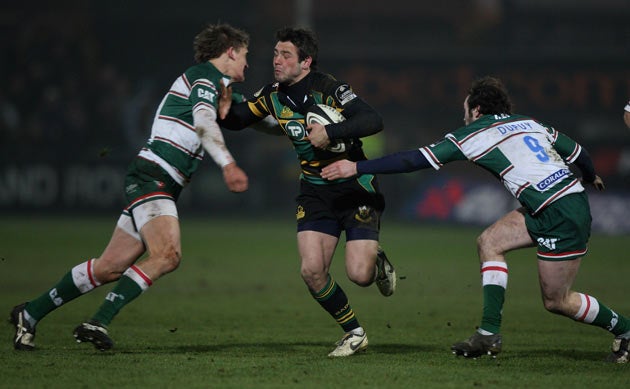Peter Bills: Referees must punish cheats

When, oh when, will rugby’s referees take off their kid gloves and sort out the mess at the breakdown?
The ruck. The pile up, the breakdown - call it what you will. Whatever name you use, it has become the biggest blight on the entire game.
Former Ireland and Irish Lion Donal Lenihan said recently during the Munster/Ulster Magners League clash "At almost every second breakdown there seems to be a penalty."
There’s a good reason for that. Players are cheating. And the sad fact is, few referees are doing much to stop them.
When you get even international referees like Alan Lewis prepared to ignore the evidence in front of their eyes, what chance is there of a crackdown?
At Thomond Park 10 days ago, Lewis, one of the top Irish officials, allowed a blatantly illegal offside by Ulster scrum half Isaac Boss to go unpunished. Well, he gave a penalty, but Lewis failed to dish out what should have been the minimum sanction - a yellow card.
Now I don’t want to slate referees like Alan Lewis. All referees have a nightmare of a job. They need eyes in the back of their heads to do their jobs these days, there’s so much going on in the game and at such speed.
Maybe Lewis thought he was being kind, to Boss and the supporters who might have seen an uneven contest had he sent the Ulster player to the sin-bin for ten minutes. I honestly don’t know.
But what referees like Lewis are doing by continuing to avoid serious punishment for offences such as Boss’s - coming round completely the wrong side of the ruck onto the Munster side to try and kill their chance of winning quick loose ball - is risking killing the game.
Until those who offend are sorted out and sent off the field, firstly for 10 minutes and then on a permanent basis if they carry on doing it, we’ll never have the type of fast, free flowing game that is surely the ambition of most teams and players.
You can’t score tries - well, it’s nearly impossible - in these days of solid, supremely organised defences unless you win quick ball at the breakdown. And those who try and slow down or stop completely the opposition’s supply are tying a knot around the throat of attacking, running rugby.
Why should they be allowed to get away with it? Boss knew exactly what he was doing in the 38th minute at Thomond Park. Just as thousands of others who do the same or something similar in so many games.
The great contrast to this came in the Northampton v Leicester Guinness Premiership match last Saturday. Northampton’s inventive backs prospered, notably full-back Ben Foden, because Leicester were unable to kill the loose ball. Wayne Barnes' refereeing early on made it clear that wasn’t an option and we got a game – an absolutely cracking game, actually. A coincidence? Not at all.
Foden’s second half try, brilliantly made for him by a classic piece of skill in which the ball carrier timed his pass to perfection and the support player’s (Foden) clever running angle did the rest, was exquisite. Yet had Leicester been able to kill the loose ball, we’d never have seen that superb skill.
Fast, re-cycled second phase possession is the oxygen of attacking rugby. Without it, the game stagnates and dies.
But Alan Lewis is far from the only referee who fails to crack down on all this. There seems to be, among most referees, a view that sending players to the sin bin should be a last resort, to be avoided wherever possible.
Unfortunately, such a policy is being ruthlessly exploited by players all around the world. Many have taken it as a green light to cheat, safe in the knowledge that the odds against them being sin-binned or even sent off for permanent offending, are remote.
The result is the kind of mess you see in the modern game. How many times do referees shout ‘Ruck - Hands off’ in a match? It can be heard at almost every ruck. It’s as if players don’t know the rules.
Of course they do. The truth is, by the time a referee has shouted that twice, the damage - i.e. slowing down the opposition’s ball - has been done. And slow ball is useless at cracking modern day defences. A contest for the loose ball is one thing, killing it illegally quite another.
This problem won’t be solved until referees start playing hard ball.
Join our commenting forum
Join thought-provoking conversations, follow other Independent readers and see their replies
Comments
Bookmark popover
Removed from bookmarks